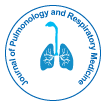Managing Chronic Airflow Obstruction: Strategies to Slow Progression and Enhance Quality of Life
Received Date: Jun 01, 2024 / Published Date: Jun 29, 2024
Abstract
Chronic airflow obstruction, notably chronic obstructive pulmonary disease (COPD), poses a significant health burden globally, primarily attributed to smoking and other environmental factors. This progressive condition manifests with symptoms such as dyspnea and chronic cough, impacting patients' daily lives. While COPD lacks a cure, timely interventions can effectively mitigate its progression and improve patient outcomes. Key strategies include smoking cessation programs, vaccinations against respiratory infections, pulmonary rehabilitation to enhance respiratory function, and pharmacological treatments such as corticosteroids to manage exacerbations. Furthermore, public health efforts focusing on reducing smoking rates and improving air quality indoors and outdoors are crucial in preventing new cases. This abstract reviews current management approaches aimed at slowing disease progression and enhancing quality of life for COPD patients, emphasizing comprehensive care and proactive health measures to alleviate symptoms and improve overall respiratory health.
Citation: Nakamura A (2024) Managing Chronic Airflow Obstruction: Strategies toSlow Progression and Enhance Quality of Life. J Pulm Res Dis 8: 201.
Copyright: © 2024 Nakamura A. This is an open-access article distributed underthe terms of the Creative Commons Attribution License, which permits unrestricteduse, distribution, and reproduction in any medium, provided the original author andsource are credited.
